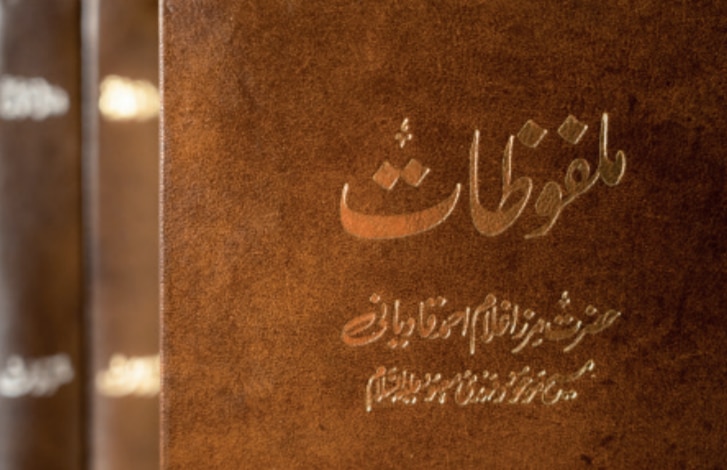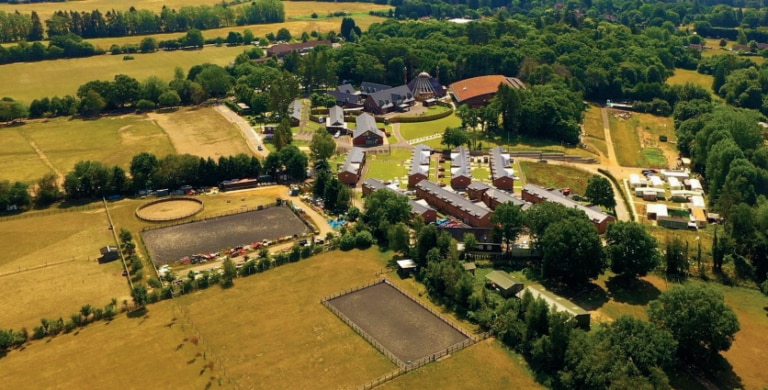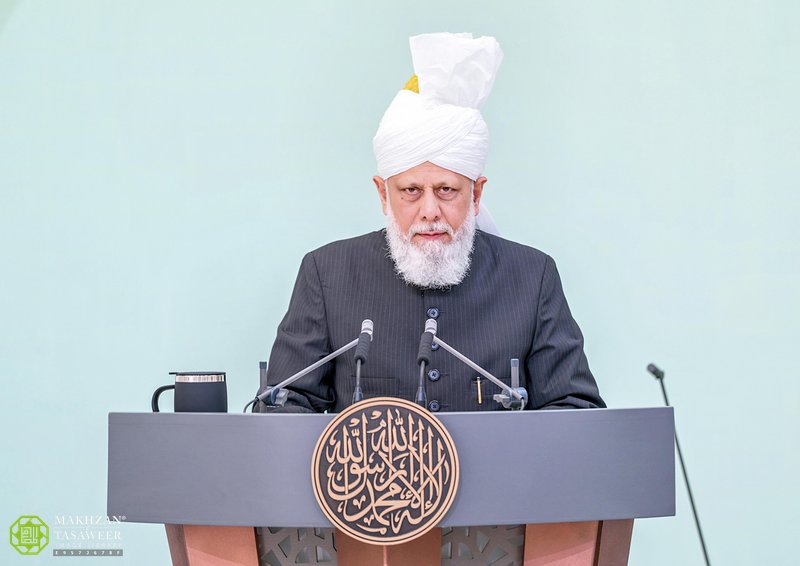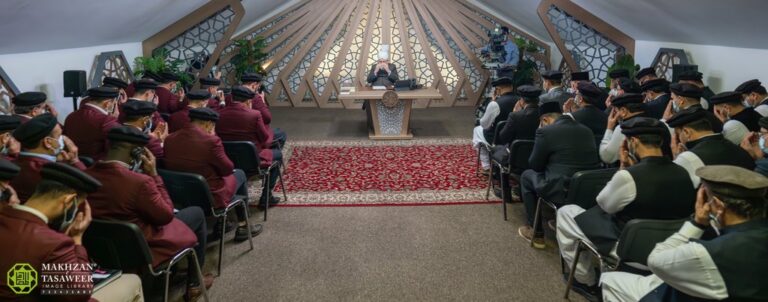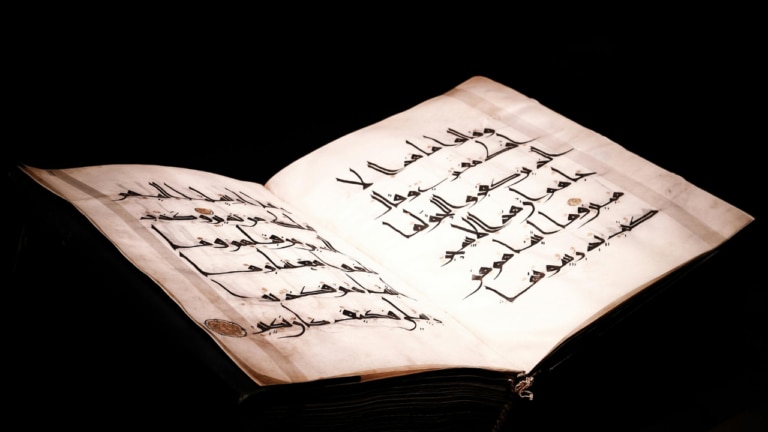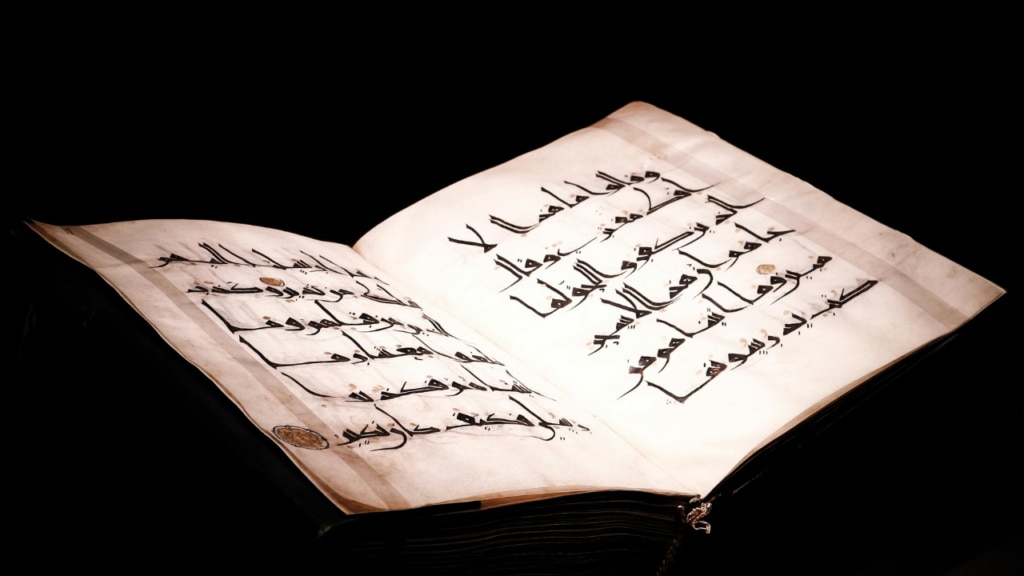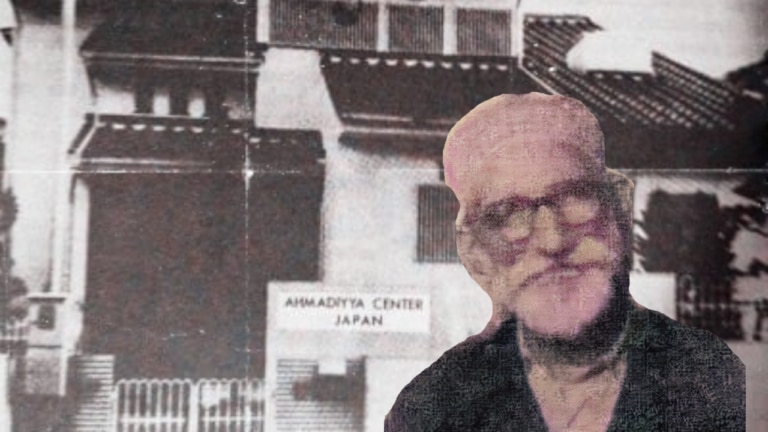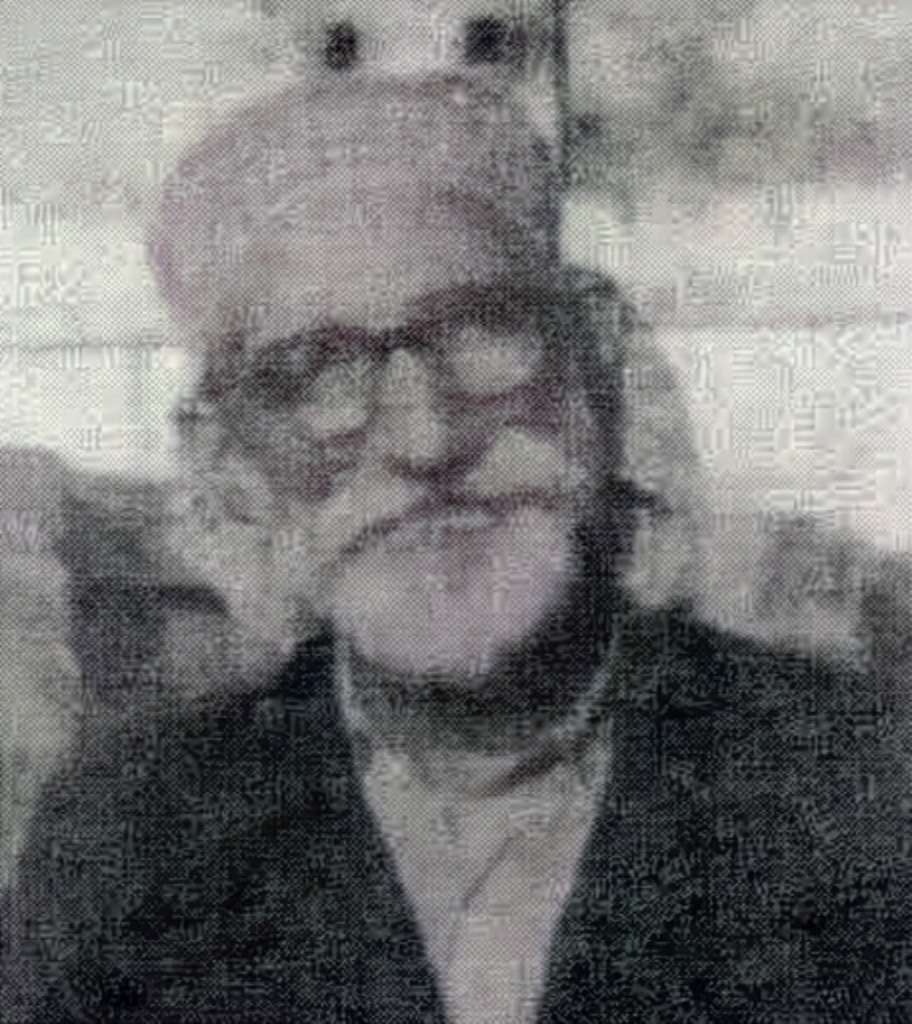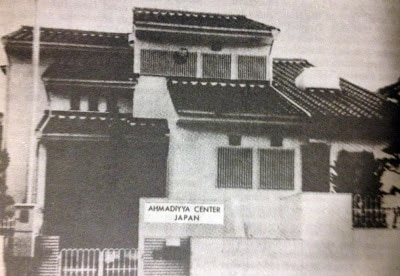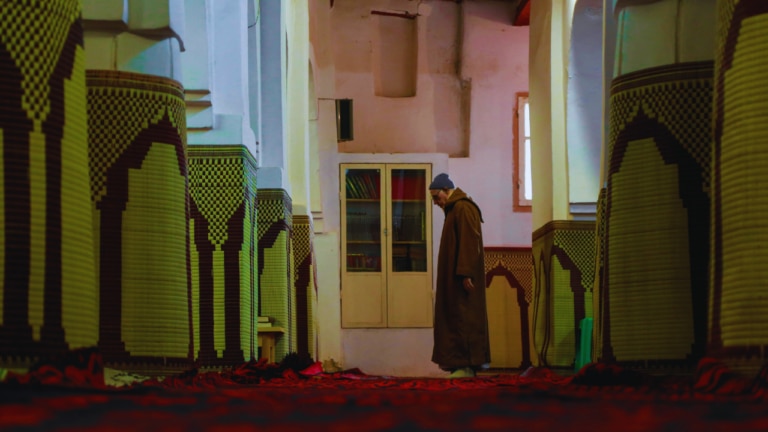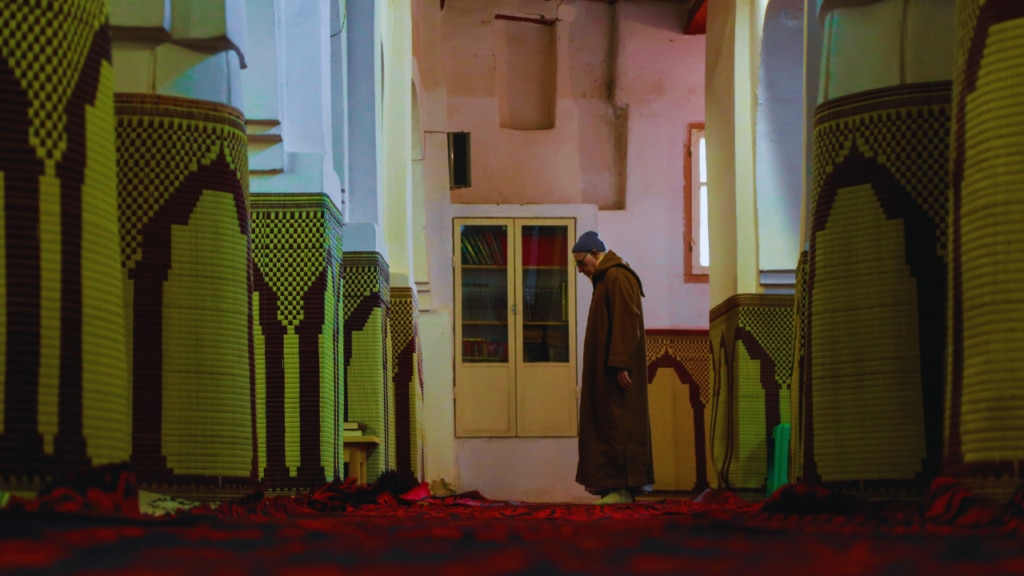Friday Sermon
9 January 2026
Financial sacrifice and true righteousness: Waqf-e-Jadid 2026
After reciting the tashahhud, ta‘awwuz and Surah al-Fatihah, Hazrat Khalifatul Masih Vaa recited verse 93 of Surah Aal-e-Imran and stated:
The translation of the verse recited is: “Never shall you attain to righteousness unless you spend out of that which you love; and whatever you spend, Allah surely knows it well.”
Under the commentary of this verse, Hazrat Khalifatul Masih Ira has written that “in Surah al-Baqarah, where the first ruku’ begins in the Holy Quran, with regards to the righteous it is mentioned:
وَ مِمَّا رَزَقْنٰھُمْ یُنْفِقُوْنَ
“In other words, they spend out of whatever Allah has given them. This is mentioned in the first ruku’. Furthermore, spending in the cause of Allah has been greatly emphasised on various occasions in this chapter. […] As such, you will never attain to true righteousness until you spend out of your wealth.”
He further says that “According to me, the meaning of: مِمَّا تُحِبُّوْنَ ‘out of that which you love’ is wealth, because Allah the Almighty says:
وَ اِنَّہٗ لِحُبِّ الۡخَیۡرِ لَشَدِیۡدٌ
“‘And surely, he is very keen for the love of wealth.’ (Ch. 100: V. 9) Thus, in order to attain true righteousness, it is necessary to spend out of that which you hold dear; out of your wealth.” (Haqaiq-ul-Furqan, Vol. 1, p. 500)
The Promised Messiahas has also expounded on this on various occasions. At one place, he says: “You should not be in love with wealth. Allah the Almighty says:
لَنۡ تَنَالُوا الۡبِرَّ حَتّٰی تُنۡفِقُوۡا مِمَّا تُحِبُّوۡنَ
“‘Never shall you attain to righteousness unless you spend out of that which you love in the way of Allah.’”
The Promised Messiahas further states: “No one can claim to have performed a virtue by spending out of something useless and worthless. The door to righteousness is narrow. Thus, bear in mind that no one can enter it by spending out of that which is worthless. The reason for this is that it has clearly been stated in the Holy Quran:
لَنۡ تَنَالُوا الۡبِرَّ حَتّٰی تُنۡفِقُوۡا مِمَّا تُحِبُّوۡنَ
“That is, until you spend out of your most dear and precious things, you will not be able to attain the status of being beloved and honoured. If you do not wish to face difficulties and attain true righteousness, how then can you succeed and prosper?” (Tafsir Hazrat Masih-e-Maudas, Vol. 2, pp. 130-131)
Hence, there are those who have a good income, but in terms of their financial sacrifices, are not on the same level as those Ahmadis who earn an average income. Such people should remember that Allah the Almighty says that true sacrifice is to spend in His cause out of that which you most love. Only then will you be able to gain the pleasure of Allah the Almighty and become recipients of His blessings. Allah the Almighty has not only mentioned spending in the cause of Allah once or twice, but has done so on multiple occasions throughout the Holy Quran. For example, at one place, Allah the Almighty says:
وَ اَنۡفِقُوۡا فِیۡ سَبِیۡلِ اللّٰہِ وَ لَا تُلۡقُوۡا بِاَیۡدِیۡکُمۡ اِلَی التَّہۡلُکَۃِ وَ اَحۡسِنُوۡا اِنَّ اللّٰہَ یُحِبُّ الۡمُحۡسِنِیۡنَ
“And spend for the cause of Allah, and cast not yourselves into ruin with your own hands, and do good; surely, Allah loves those who do good.” (Ch. 2: V. 196)
Thus, at times, not spending in the way of Allah leads to ruin. On the one hand, there is the claim that we have accepted the Imam of the Age, that we are those who fulfil the prophecy of the Holy Prophetsa, and that, in accordance with his prophecy, we have entered the Jamaat of the Promised Messiahas. On the other hand, at times, there is reluctance to make financial sacrifices. This is not right. Generally speaking, the Jamaat pays great attention to this matter, but among some people – especially those whom Allah the Exalted has granted great financial capacity – this attitude sometimes develops.
It is by the grace of Allah the Almighty that the majority of the Jamaat participates in financial sacrifices with great happiness, but as I mentioned, there are some in whom this reluctance is found. Such people should keep in mind this injunction of Allah the Almighty: that spending wealth in the way of Allah is essential.
Indeed, among those who earn more, there are some who take part in various [Jamaat] schemes and do so generously. However, I would also like to mention in reference to this that some of them do not pay their obligatory chanda – such as their Hissa Amad [prescribed contribution based on income] – at the correct rate, nor do they do so regularly. Such people ought to assess themselves.
Then Allah the Almighty states elsewhere in the Holy Quran:
اٰمِنُوۡا بِاللّٰہِ وَ رَسُوۡلِہٖ وَ اَنۡفِقُوۡا مِمَّا جَعَلَکُمۡ مُّسۡتَخۡلَفِیۡنَ فِیۡہِ فَالَّذِیۡنَ اٰمَنُوۡا مِنۡکُمۡ وَ اَنۡفَقُوۡا لَہُمۡ اَجۡرٌ کَبِیۡرٌ
“[O people], Believe in Allah and His Messenger, and spend in the way of Allah out of that to which He has made you heirs. And those of you who believe and spend will have a great reward.” (Ch. 57: V. 8)
Thus, Allah the Almighty has promised a great reward for those who spend in His way. Likewise, Allah the Exalted says:
وَ مَا لَکُمۡ اَلَّا تُنۡفِقُوۡا فِیۡ سَبِیۡلِ اللّٰہِ وَ لِلّٰہِ مِیۡرَاثُ السَّمٰوٰتِ وَ الۡاَرۡضِ
“And why is it that you spend not in the way of Allah, while to Allah belongs the heritage of the heavens and the earth?” (Ch. 57: V. 11)
That is, whatever a person holds in his hands from this material world, in the end, he will leave it behind and die, and it will come into the possession of Allah alone. Nothing remains in a person’s possession. Even inheritance gets distributed, and if the heirs are not righteous, they squander it. In the end, nothing remains in his hands – neither in this world nor in the Hereafter. Therefore, one should fear Allah and spend for His sake; then Allah the Almighty places blessing in it and also safeguards future generations.
Similarly, Allah the Exalted says elsewhere in the Holy Quran:
فَاتَّقُوا اللّٰہَ مَا اسۡتَطَعۡتُمۡ وَ اسۡمَعُوۡا وَ اَطِیۡعُوۡا وَ اَنۡفِقُوۡا خَیۡرًا لِّاَنۡفُسِکُمۡ وَ مَنۡ یُّوۡقَ شُحَّ نَفۡسِہٖ فَاُولٰٓئِکَ ہُمُ الۡمُفۡلِحُوۡنَ
“So fear Allah as best you can, and listen, and obey, and spend in His cause; it will be good for yourselves. And whoso is rid of the covetousness of his own soul – it is such who shall be successful.” (Ch. 64: V. 17)
Thus, Allah the Almighty has declared that miserliness and stinginess are not right. If one wishes to become a recipient of the favours of Allah, one must spend in His way. In the same manner, there are countless other verses in the Holy Quran that urge us to spend from our wealth in the way of Allah the Almighty. And in this age, as the Promised Messiahas has repeatedly stated, wealth is required for the propagation of religion, for expanding religious works, and for the propagation of Islam – and it is from this that you should spend.
It should also be remembered that those who spend their wealth for the sake of religion, as I have explained through the verse, do not benefit only themselves; rather, the entire nation benefits. Therefore, our compassion for the nation and our compassion for humanity necessitates that we spend in the way of Allah – spending that helps people and also serves the propagation of Islam.
The ahadith also contain many instances in which the Holy Prophetsa exhorted people to make financial sacrifices. It is narrated from Hazrat Hasanra – and this is a Hadith Qudsi – that the Holy Prophetsa said, conveying Allah’s words:
“O son of Adam, deposit your treasure with Me and be content. There will be no fear of it being burned by fire, nor of it being drowned in water, nor of it being stolen by a thief. The treasure that is kept with Me, I shall return to you in full on the day when you will need it the most.” (Al-Jami‘ Li Shu‘ab Al-Iman, Vol. 5, Hadith 3071, Maktaba Al-Rushd, p. 45)
Thus, this is the promise of Allah the Almighty – that if you spend in the way of Allah, Allah will return the wealth in full. Allah the Almighty also says in the Holy Quran:
وَ مَا تُنۡفِقُوۡا مِنۡ خَیۡرٍ یُّوَفَّ اِلَیۡکُمۡ وَ اَنۡتُمۡ لَا تُظۡلَمُوۡنَ
“And whatever of wealth you spend, it shall be paid back to you in full, and you shall not be wronged.” (Ch. 2: V. 273)
Elsewhere, it is also stated that it will be returned many times over. These, then, are the ways in which Allah the Almighty gives to those who spend in His way.
We are fortunate today, as I have mentioned earlier, that the majority of Ahmadis have understood this reality. They spend abundantly in the way of Allah. There were similar examples of such spending even in the time of the Promised Messiahas. In fact, upon witnessing this, he once remarked that he was astonished at how people who were poor were making such great sacrifices for the sake of religion. (Malfuzat, Vol. 10. p. 263)
The same condition exists today. Generally, a large number of Ahmadis understand very well that they must spend in the way of Allah the Almighty. They are well aware of this. I have observed that many among the poor or those from the middle-income group make very great sacrifices, because they have the understanding that Allah the Almighty will return this wealth to them, or that they will become the recipients of the blessings of Allah. How this will happen – Allah knows best, but they will be granted in this world and in the next.
The fact of the matter is that in the Hereafter, Allah the Almighty will return it in the form of a reward, and will include it in their recompense, and these sacrifices will become a means for the elevation of their ranks.
Then, in another hadith, the Holy Prophetsa said that whoever gives even a single date in the way of Allah from pure earnings – and Allah accepts only that which is pure – Allah accepts that date with His right hand and continues to increase it, until it becomes like a mountain. The Holy Prophetsa gave the example that just as one of you nurtures a small calf until it grows into a large animal, in the same way, your wealth continues to grow if you give it in the way of Allah. (Sahih al-Bukhari, Vol. 3, Hadith 1410, Nazarat-e-Ishaat, Rabwah, pp. 28-29)
However, the condition is that the wealth must be pure. It should not be that it was earned through wrongful means, or that savings were accumulated through unlawful methods and then given as chanda. No, rather, only when the wealth is pure does Allah the Exalted accept it.
Then, it is mentioned in a hadith that the Holy Prophetsa said: “On the Day of Judgement, until the judgement is completed, those who spend in the way of Allah will remain under the shade of the wealth that they spent.” (Musnad Ahmad bin Hanbal, Vol. 5, Hadith 17466, Maktaba Aalam Al-Kutub, Beirut, p. 895)
Thus, even on the Day of Judgement, financial sacrifices – provided they are offered with good intentions and are from pure wealth – become a means of attracting and drawing the grace of Allah the Almighty. As I have said earlier, the members of the Jamaat understand this matter, because Allah the Almighty has stated that the financial sacrifices of those who tread on the path of righteousness are accepted, and thereafter Allah the Almighty abundantly bestows them.
Most members of the Jamaat try to act upon this. Allah the Almighty states at one place in the Holy Quran:
وَمَنۡ یَّتَّقِ اللّٰہَ یَجۡعَلۡ لَّہٗ مَخۡرَجًا۔وَّیَرۡزُقۡہُ مِنۡ حَیۡثُ لَا یَحۡتَسِبُ ؕ وَمَنۡ یَّتَوَکَّلۡ عَلَی اللّٰہِ فَہُوَ حَسۡبُہٗ ؕ اِنَّ اللّٰہَ بَالِغُ اَمۡرِہٖ ؕ قَدۡ جَعَلَ اللّٰہُ لِکُلِّ شَیۡءٍ قَدۡرًا
“And he who fears Allah – He will make for him a way out, And will provide for him from where he expects not. And he who puts his trust in Allah – He is sufficient for him. Verily, Allah will accomplish His purpose. For everything has Allah appointed a measure.” (Ch. 65: V.3-4)
The Promised Messiahas states: “We should always remember as to how far we have progressed in righteousness and purity. The yard stick for this is the Quran. Allah the Almighty has also given one sign among the signs of a righteous person, that Allah the Almighty frees the righteous one from the disliked matters of the world and Himself becomes the Guarantor of his affairs, as He has said:
وَ مَنۡ یَّتَّقِ اللّٰہَ یَجۡعَلۡ لَّہٗ مَخۡرَجًا۔ وَّ یَرۡزُقۡہُ مِنۡ حَیۡثُ لَا یَحۡتَسِبُ
“That is, ‘Whoever fears Allah the Almighty, Allah the Almighty creates for him a way out from every hardship.’ (Ch. 65: V. 3-4)”
The ones who sacrifice for the sake of Allah the Almighty can only be those who fear Allah the Almighty and who make sacrifices for His sake. When they do so, then they are no longer worried about how their needs will be fulfilled, or how their expenses will be covered. Allah the Almighty continues to create a means for them.
The Promised Messiahas states: “Allah the Almighty creates for him a way out from every hardship and creates for them such provisions that they cannot even comprehend.” (Malfuzat, Vol. 1, 2022, pp. 10-11)
Then in another place, the Promised Messiahas states: “Allah the Almighty protects those who sacrifice for His sake and those who walk upon righteousness from calamities.” He continues, “those for whom Allah the Almighty becomes a Guardian are saved from the pains of the world, (they are saved from difficulties and hardships) and enter into a life of true comfort and tranquillity. For them is the promise of Allah the Almighty:
وَ مَنۡ یَّتَّقِ اللّٰہَ یَجۡعَلۡ لَّہٗ مَخۡرَجًا۔ وَّ یَرۡزُقۡہُ مِنۡ حَیۡثُ لَا یَحۡتَسِبُ
“That is, ‘Whoever adopts righteousness, Allah the Almighty – through His grace – delivers him from every calamity and suffering. He Himself becomes responsible for his provision and provides for him in ways that he cannot even comprehend.’” (Malfuzat, Vol. 6, 2022, p. 217)
Similarly, in one place, the Promised Messiahas also stated: “Those who place their trust in, and incline towards God Almighty never go to waste.” He continues, “God Almighty is the real Provider. The person who places trust in Him can never remain deprived of providence. He (meaning Allah the Almighty) provides provision in every manner and from every place for the person who places trust in Him. God Almighty states that the one who relies on Me and puts his trust upon Me, I cause provision to rain upon him from the heavens and bring it forth from beneath his feet. Thus, every person should place their trust in God Almighty.” (Malfuzat, Vol. 9, 2022, pp. 240-241)
Similarly, the Promised Messiahas has imparted advice on various occasions and has also explained the commentary of this verse. It is the special grace of Allah the Almighty that the members of the Jamaat understand this matter. They are those who offer sacrifices for the Jamaat, and they are also those who witness the manifestations of Allah the Almighty’s grace. We find countless examples every year from around the world. Since at this time I am speaking in relation to Waqf-e-Jadid, therefore I will present some examples of those people who gave donations for Waqf-e-Jadid and whom Allah the Almighty blessed, or those who had such certainty and faith in Allah the Almighty that if they offered sacrifices, they believed Allah the Almighty would fulfil their needs.
As I have also said earlier, the spirit of sacrifice is very strong among those people who are of average or low income and it is their examples that are usually presented before us.
There is a local Jamaat in Indonesia called Pangir. Tahira Sahiba is a member of the Jamaat and says, “I was a part-time teacher; my salary was very low. At the end of the financial year of Waqf-e-Jadid, I received a message from the National Secretary Sahib that my pledge of Rs 130,000 was still outstanding. The only amount I had saved aside was to start a small business.”
She had the amount equal to that of her promise, but she had kept it for personal use.
She says that “at first I felt conflicted in my heart, but then I placed my trust in Allah, and I gave the entire amount that I had in Waqf-e-Jadid. Thereafter, Allah the Almighty blessed me, and I unexpectedly received a bonus from the school, which I was in dire need of. And along with this, I also received the good news that my name had been included among those receiving government subsidies.” She says, “I had not even been able to fully express my gratitude to Allah the Almighty for fulfilling my needs, when, during this same time, my teacher registration number was also issued, for which I had been waiting for years.” She says that “I am convinced that this grace of Allah the Almighty occurred due to the significance of my chanda.”
Kenya, which is a country in eastern Africa. There are thousands of miles between Indonesia and Kenya, but the mentality and attitude of members by God Almighty’s grace is one and the same everywhere.
Listen to how God Almighty blesses them as well. The Amir Jamaat of Kenya has written that a local mu‘allim details the story of a woman who regularly makes financial contributions despite the fact that she does not have any real regular income. In such difficult circumstances, there is a great need for money and a great love for it, and so, to spend out of one’s wealth in such a state is the equivalent of carving out one’s own heart, or cutting out one’s liver as the Promised Messiahas has detailed.
In any case, he writes that the woman had set her pledge for Waqf-e-Jadid at 400 shillings for the year, which she paid in full, saying that this is all the money that she had. She explained that she is going back with nothing else to her name. But look at how God Almighty responded, as He says that “I grant provisions from sources where you cannot even imagine.”
God Almighty did not leave her empty-handed. When she mentioned that she no longer has anything to her name, God Almighty declared that “I shall not leave you with nothing.” A few days later, she received an amount totalling 1400 shillings from her daughter, with a note that she wanted her mother to use the amount to fulfil her pledged contribution and to spend the rest on personal needs.
After this, her son-in-law called. It is a custom there that the dowry money is made over to the parents of the girl after marriage. Thus, he sent her two cows, which were valued at 90,000 shillings. And that was not all.
She says that she only contributed 400 shillings, but God Almighty blessed her in return in extraordinary and amazing ways – He blessed her from places that she had no expectation to receive anything from. Then, in the most unexpected way, she started receiving cash amounts and gifts – various other items of need – from her children and family members. She expressed gratitude to God Almighty and explained that this transformed her faith into conviction that this was the result of the blessings of financial contributions.
Such sacrifices in God’s way not only garner blessings of God but also increase the faith of those who witness this.
Guinea-Conakry is another country in Africa. The missionary there writes that a woman in a village in the Kundya region pledged Fr. 150,000. And while this may sound like a large amount, the currency there has very little value, so this is actually a small amount.
In any case, he writes that at the end of the year, our local missionary went to her village to collect financial contributions from people. When he arrived there, she had gone out to the market to sell some vegetables. Since time was short, the local missionary went to meet her in the marketplace.
He reminded her of the pledge she had made that remained to be paid. The woman said – with great pain in her voice – that she does not have anything to fulfil her pledge with at this time.
The woman told the local missionary to go on his way for now and that she would certainly fulfil her pledge. Now, look at how this woman, who has joined Islam and has become an Ahmadi – how her faith has progressed. She did not try to evade her duty by telling the person to be on his way by saying that she didn’t have anything. Rather, she said, “I don’t have anything at this moment, but I will – as soon as possible – arrange for something and give the amount to you.”
In any case, our local missionary went on to collect in the next town. Once he was done there, he returned to this town and returned to the woman.
She presented him with Fr. 100,000 and explained that this is my entire day’s earnings, which I am spending in the way of God Almighty. She explained that no special food had been made in the home for several days, and for the last many days, the children had been eating very simple food.
She had intended that whatever money she made today, she would try to give her children something special, but she said to the mu‘allim, “as you have also explained, and I have also experienced, that wealth spent out of that which one loves never goes to waste. God Almighty provides for His servants out of that which they cannot even imagine. This is exactly what I have also borne in mind – that my sacrifice will certainly not go in vain, and that is why I am giving this all to you today.”
The local missionary recounts that he was still standing there when the woman received a phone call. It was her son saying, “I have some things that I need to hand over to you. Please, can you meet me at such and such place and get it from me?” The woman went to meet her son, and he gave her Fr. 500,000, saying that he was giving this to her for her household expenditures.
The woman came back jubilant and had only begun explaining what had happened when her phone rang again. The call was from her other son, who lives in another town, but he was nearby and explained that he could not come to her because he was only passing through. And so, he asked her to come to him, saying that he had a gift for her.
When she went to him, he also gave Fr. 300,000 to his mother, saying that this was for her household expenses. She came back and started to explain that “this is not just a grace of God Almighty that I have witnessed, but it is also a means of uplifting my faith and fortifying my conviction that God Almighty has blessed me for spending in the way of His Jamaat. This has demonstrated to me that this Jamaat is true. (Thus, in this way, God Almighty Himself strengthens people’s faith), and she said that the sacrifices that we are making in the way of God Almighty are certainly finding acceptance by Him.”
She says, “I spent 100,000 in God’s way, but He multiplied it many times over for me and returned it.”
Then there is an account of a sincere member named Ali Baig Sahib in a village called Aktau situated in Kazakhstan. He is very regular in making contributions and makes sure that he pays every month on time. For some time, due to difficult circumstances, he was not able to make financial contributions. This continued until the financial year for obligatory contributions, and Waqf-e-Jadid had come to an end, and he had still not been able to make any payments.
He was extremely worried, and one day after Friday prayer, he began explaining that some large debts had accrued, which had caused the banks to close his accounts, and that is why he could not make his financial contributions.
He says that he was just praying that God Almighty causes his grace to descend upon him. He says that one day, one of the senior members in the company for which he worked gave him a handsome bonus, which they had been waiting for a year, but which did not seem like it would actually materialise. By the grace of God, with this bonus, he was able to pay off his debts and fulfil his pledges for financial contributions. Ali Baig Sahib writes that he has full conviction that this all transpired so that he could fulfil the pledge that he had made.
Another incident detailing how God Almighty does not keep a loan for Himself but rather blesses a person in unexpected ways comes from Australia, where the Amir Jamaat has shared an account.
Now there are many incidents from different countries, but they are all very similar.
He writes that there is a member from the Gold Coast who had already fulfilled his pledge of $1000. Amir Sahib writes that he brought his attention to the importance of this matter and requested him to increase his contribution.
Generally, not only those who are very affluent but even those who are slightly affluent often also do not make sacrifices the way they should. But then there are some people who do like this individual.
Although they do not have the same standard of sacrifice that the poorer members possess, they do end up making good sacrifices. In any case, I’m narrating the example from amongst those people who are living in relatively better conditions, who do make sacrifices. This person had made a pledge of $1000 and already fulfilled that pledge. When he was asked to increase the amount, he contributed another $6000 in addition to the thousand from before, totalling $7000 as his contribution. The very next day, he called to inform that his wife received a phone call from her insurance company telling her about a claim that had been in process for some time, which they were not even aware of and that they were going to receive an amount of $12,000 as a refund. He explains that he had made a contribution of $6000 and within two days God Almighty had doubled it and returned it to him, and He granted it to him from a place that he had absolutely no expectation for.
Then the missionary of Guinea-Bissau relates an incident describing a manifestation of Allah’s help that came unexpectedly. He writes that a sincere Ahmadi, Abu Thaniyah Sahib, was living abroad. He had not been able to find suitable employment for a long period of time, as a result of which he was under great financial pressure. (One can well imagine the condition of a person living away from home, without employment and under financial strain; and at such a time, if any wealth comes into one’s hands, it would become dearest to him, and he would spend it upon himself. Yet observe the state of these sincere individuals. He states that during this very period, a chanda appeal was launched by the Jamaat. Responding to this appeal, Abu Thaniyah offered a sacrifice in the way of Allah the Almighty and gave whatever he had. Although he did not possess any significant amount at that time, and whatever he did have was most dear to him, he nevertheless gave it in the way of Allah.
In any case, Allah the Almighty accepted his sacrifice soon after. Hardly a week had passed since the payment of chanda when he received a telephone call from a company informing him that he was being employed without any interview. He had already submitted an application, but they said that there was no need for an interview and that he should come and start work. Abu Thaniyah Sahib relates that this was the blessing of the sacrifice made in the way of Allah the Almighty and a practical fulfilment of His promise of help, in that Allah the Almighty grants back manifold, and that He bestowed it in such an unexpected manner as he had not even anticipated it.
The Missionary-In-Charge of Russia writes that Ikram Jan Sahib is a sincere member. He states that last month he sent his chanda and expressed, in a very heartfelt manner, that for the past two months he had not been able to pay his chanda and had been greatly distressed at being deprived of the opportunity to make a sacrifice in the way of Allah the Almighty. Observe that these are new Ahmadis, living in remote areas, yet how deep is their yearning to offer financial sacrifices, for they are convinced that it is through these sacrifices that the blessings of Allah the Almighty descend upon them.
He says, “I was praying a great deal”. People pray for their businesses, but if he had any concern regarding wealth, it was solely for the purpose of paying his chanda. He further states, “I prayed profusely that Allah the Almighty may help me so that I do not remain deprived of this blessed opportunity and am not denied the chance to make a sacrifice in the way of Allah.” One day, while on the way to the office, he again prayed earnestly before God that he might receive his salary soon. (The circumstances there are that at times, salaries are often delayed.) He prayed so that he could pay his chanda. He says that when he reached the office, he received his salary unexpectedly on that very day. He immediately paid his chanda and expressed gratitude to Allah the Almighty that he had not been deprived of the opportunity to make a sacrifice.
From India, the Inspector of Waqf-e-Jadid writes that in one Jamaat there is an individual whom they visited and he had an outstanding amount of Rs 16,000 for his Waqf-e-Jadid chanda. He had to pay an essential instalment for a particular matter, for which he had set this amount aside. Upon their arrival, he said, “The instalment that I am required to pay will be managed; I will pay it later. Since my chanda is outstanding and you have come to me, I will first pay you the outstanding chanda.” They told him that he was in difficult circumstances and that at this time he should pay half and the remainder later. He replied, “One must first pay what is due for Allah the Almighty; as for the remaining matters, Allah the Almighty will, insha-Allah, make better arrangements. If I act with righteousness and place my trust in Allah, Allah the Almighty will create better means.”
Later, he informed them by telephone that a sum of money which had been withheld for quite some time, and which he had not expected to receive so soon, had suddenly been released. Thus, Allah the Almighty, through the blessings of chanda, fulfilled all his needs. He said, “My faith was also strengthened, and I witnessed how Allah the Almighty treats those who make sacrifices.”
Guadeloupe is a country in South America. There is a young new convert there named Jermy Dedans. He is 28 years old and is still a student. Alongside his studies, he also does part-time work. It is a poor country. He was informed of the importance and blessings of Waqf-e-Jadid. Generally, it is said that in order to cultivate the habit of chanda among new converts, they should be included in Waqf-e-Jadid and Tahrik-e-Jadid schemes and be encouraged in this regard. Accordingly, when he was informed, he said, “I have the desire to participate in this, but at present I have absolutely no money, nor do I know how I will get through the month.” In such a condition, to harbour a desire when there is nothing in one’s hand, and when one does not even know how the month will pass, is very difficult. [In such circumstances], when a person does receive some money, usually one would first spend it upon oneself. But after accepting Ahmadiyyat, the conduct of these people becomes remarkable.
The missionary said to him, “You are a student; there is no need for a very large sacrifice. You may give even one or two Euros, according to your capacity. Allah the Almighty grants reward according to intentions.” He states that after one week, he came to the mission house and paid 160 Euros as Waqf-e-Jadid chanda. He said, “The very week in which I resolved to make the sacrifice of Waqf-e-Jadid, Allah the Almighty placed blessings in my circumstances. The place where I was working part-time gave me my salary before it was due, and even gave me more than usual, without any apparent reason. I myself could not understand why they gave me more.”
He further relates that after a few days, he again informed them that another extraordinary occurrence had taken place. He said, “On the day I paid 160 Euros, I wanted to give more, but I did not have the means. However, only a few days after paying the chanda, I unexpectedly received a fairly substantial amount. I was owed some money from a training centre, which, despite repeated requests, I had not been able to obtain. Yet Allah the Almighty, through the blessing of chanda, enabled me to receive that amount as well.” Accordingly, he paid a further 140 Euros towards Waqf-e-Jadid. On the one hand, he was in a state whereby he was struggling to even find food for himself and on the other hand, he was able to give 300 Euros as chanda.
Similarly, there are many other such incidents. Some people received amounts in an extraordinary way.
From the Jamaat of Kyrgyzstan, Yulia Govanova Sahiba states: “At the place where I work, I asked whether an increase in my salary was possible. They informed me that it was only possible in the form of a bonus, and it was not known how much the bonus would be.” She further says, “In any case, as soon as I received a portion of my salary in the month of October, the first thing I did was to pay my Waqf-e-Jadid chanda, even though we had many personal expenses.”
This itself is a sign of the promise of Allah the Almighty; indeed, this is the essence of sacrifice, and a sign of Allah’s promise: i.e., to spend in the way of Allah out of that which one holds dear. “At that time, this amount was dear to me because I needed it and had many expenses. Yet for me, it was essential first to fulfil the pledge I had made to the Jamaat.” At the very end of that same month, she was informed that her salary had been increased by 40% and that, in addition, she could also receive an extra bonus based on the quality of her work.
She says: “I was greatly astonished, for I had absolutely no expectation that my salary could be increased to such an extent. Just a day earlier, while calculating my expenses, I had realised that an additional amount roughly equal to this was necessary. I had already paid my Waqf-e-Jadid chanda, but the shortfall in those expenses was made up through this increase.” She states, “I am most grateful to Allah, and I firmly believe that this extraordinary and unexpected favour granted by Allah the Almighty was due to the blessings of chanda.”
She further states, “I will mention another matter as well. I had another business which I had been running for some time, but there was no progress in it. However, this year in November, when I fulfilled my pledge, after fulfilling that pledge, in December, the profit of that business doubled.”
Similarly, from Bandung Jamaat in Indonesia, there is a member, Rahma Sahiba. She is a freelance writer associated with Indonesia’s national media and is a well-educated lady. She states that through this work, she meets her personal needs. This year, due to the rejection of some of her articles and the poor sales of her books, she was unable to fulfil her pledge for Waqf-e-Jadid. As a result, she was deeply concerned and anxious.
Placing her trust in Allah, she paid part of the outstanding amount from her personal savings and prayed, saying, “O Allah, everything belongs to You. Remove from my heart this anxiety as to how my expenses will be met.” She relates that she had not even folded her prayer mat after offering the prayer when she received a phone call from a friend who urgently required her assistance with a translation. Upon completion of the task, that friend gave her an envelope containing an amount exactly equal to what she needed to fulfil her pledge for Waqf-e-Jadid. She immediately paid that amount towards Waqf-e-Jadid.
Thereafter, Allah the Almighty bestowed His grace in such a manner that she received a message from her editor informing her that her book had been accepted at an international level. Instead of the previous 10 per cent, she would now receive a royalty of 30 percent. Furthermore, through the blessings of her sacrifice, Allah the Almighty also paved the way for her son’s admission to a medical college, something which had appeared impossible.
She states that it is her personal experience that ever since she began setting aside contributions first from her income, Allah the Almighty Himself continues to resolve all her worldly affairs. This is a promise of Allah the Almighty, and this is how Allah the Almighty fulfils it.
I will leave out some of the accounts, and will now present some details from this year’s Waqf-e-Jadid reports that have been received from the various Jamaats with regard to their collection. Although the reports are not complete – especially in view of the present circumstances, particularly in Africa, where full reports cannot be received – nevertheless, whatever reports have been received will be presented.
This is the 69th year of the Waqf-e-Jadid scheme, and the 68th year has just concluded, and the new [Waqf-e-Jadid] year has now commenced. By the grace of God Almighty, members have made a total sacrifice of 14.97 million Pounds, close to 15 million Pounds. This is an increase of 1.3 million Pounds as compared to last year; all praise belongs to Allah. The UK and Canada have come first and second, respectively. Though the UK has attained first position in terms of its overall contribution, Canada has made a huge effort and has come very close to the UK this year in second position. Number three is Germany, followed by the USA, India, Australia, a Jamaat from the Middle East, Indonesia, a Jamaat from the Middle East and in 10th position is Belgium.
The top 10 countries in Africa in terms of their overall contribution are as follows: Ghana, Mauritius, Burkina Faso, Tanzania, Nigeria, Liberia, The Gambia, Sierra Leone, Benin and Mali.
By the grace of Allah the Almighty, the total number of participants is more than 1.5 million.
Those countries that have made a notable effort are: Nigeria, Niger, the Gambia, Guinea-Bissau, Congo Brazzaville, Ivory Coast, Central Africa, and Congo Kinshasa. These jamaats have made a significant effort to increase participants.
In terms of overall contribution, the top 10 large jamaats of the UK are as follows:
Islamabad, Worcester Park, Ash, Walsall, Aldershot South, Farnham North, Bordon, Farnham South, Gillingham and Aldershot North.
The top five regions [of the UK] are as follows:
Islamabad, Baitul Futuh, Fazl Mosque, Baitul Ehsan and West Midlands.
The Daftar Atfal has its separate records for Waqf-e-Jadid, and the positions are as follows:
Aldershot South, Aldershot North, Bordon, Ash, Cheam South, Farnham South, Islamabad, Roehampton Vale, Mitcham Park and Walsall.
In second position was Canada in the overall position, and their top jamaats are as follows:
Vaughan, Peace Village, Calgary, Brampton West, Vancouver, Toronto West, Mississauga, Brampton East and Toronto.
The top 10 large jamaats of Canada are as follows:
Hamilton, Edmonton West, Hadiqa Ahmad, Hamilton Mountain, Ottawa West, Regina, Airdrie, Innisfil, Vaudreuil and Sudbury.
In relation to the collection from Atfal, their positions are as follows:
Vaughan, Toronto West, Peace Village, Calgary, Brampton West, Brampton East, Vancouver, Mississauga and Toronto.
In terms of the top jamaats for collection from Atfal, the positions are as follows:
Hadiqa Ahmad, London South (they also have an area called London), Hamilton, Innisfil, Montreal West, Baitul Ehsan, Saskatoon South-West, Durham East, Woodstock, Abbotsford and Burlington.
The top five local Amarats of Germany are as follows:
Hamburg, Frankfurt, Wiesbaden, Riedstadt and Gross-Gerau.
The top jamaats are as follows:
Rodgau, Nidda, Neuwied, Rödermark, Weingarten, Flörsheim, Berlin, Koblenz, Mahdiabad and Pinneberg.
The top five regions in Atfal are as follows:
Wiesbaden, Hamburg, Hessen South-East, Mannheim and Westphalia.
The top 10 jamaats of the USA are as follows:
North Virginia, Maryland, Los Angeles, Chicago, Seattle, Silicon Valley, Dallas, Detroit, South Virginia, and Georgia-Carolina.
The position for the collection from Atfal are as follows:
Maryland, Albany, Los Angeles, North Virginia, Seattle, Chicago, Georgia-Carolina, Dallas, Oshkosh and Houston.
With regards to the positions of Pakistan, although they have attained 5th position in terms of the overall positions, because the value of the currency has dropped, despite their challenging circumstances there, their standard of sacrifice has greatly increased by the grace of Allah the Almighty.
The top jamaats in Pakistan are as follows:
Lahore, Rabwah and Karachi.
The position in terms of the districts for the collection by adults is as follows:
Islamabad, Faisalabad, Rawalpindi, Gujrat, Sargodha, Umarkot, Multan, Narowal, Mirpur Khas and Dera Ghazi Khan.
The top 10 jamaats are as follows:
Islamabad City, Township Lahore, Defence Lahore, Dar-ul-Zikr Lahore, Samanabad Lahore, Allama Iqbal Town Lahore, Baitul Fazl Faisalabad, Mughalpura Lahore, Multan City and Delhi Gate Lahore.
The top position for the jamaats in Pakistan for the collection from Atfal is as follows:
Lahore, Rabwah and Karachi.
The position of the districts is as follows:
Islamabad, Faisalabad, Narowal, Rawalpindi, Umarkot, Sargodha, Gujrat, Mirpur Khas, Layyah and Toba Tek Singh.
For the positions in India, the top provinces are as follows:
Kerala, Tamil Nadu, Jammu Kashmir, Telangana, Karnataka, Odisha, Punjab, West Bengal, Maharashtra and Uttar Pradesh.
The top 10 jamaats of India are as follows:
Coimbatore, Hyderabad, Qadian, Calicut, Melapalayam, Bangalore, Manjeri, Kolkata, Kerang and Kerolai.
The position of the jamaats in Australia in terms of collection is as follows:
Melbourne Langwarrin, Marsden Park, Castle Hill, Melbourne Berwick, Melbourne Clyde, Penrith, Perth, Melbourne West, Logan East and Melbourne East.
The position of the top 10 jamaats for collection amongst adults is as follows:
Melbourne Langwarrin, Marsden Park, Castle Hill, Melbourne Berwick, Melbourne Clyde, Penrith, Melbourne East, Perth, Melbourne West and Adelaide West.
The position of the jamaats for the collection from Atfal is as follows:
Logan East, Melbourne Langwarrin, Adelaide South, Melbourne West, Logan West, Melbourne Berwick, Castle Hill, Perth, Plumpton and Penrith.
May Allah the Almighty bestow His innumerable blessings upon all those who have rendered sacrifices, and also in their wealth. The reason I have read out all the names of the jamaats is that the jamaats want to know their positions. Therefore, it is a tradition to read out all the positions of the Jamaat. The Promised Messiahas states:
“I truly believe that miserliness and faith cannot coexist in the same heart. A person who wholeheartedly believes in God Almighty does not consider their wealth to be confined to what is locked in their money chest, but rather considers all of God Almighty’s treasures as their own. Miserliness departs from them (meaning stinginess departs from him) just as darkness is dispelled by light.” (Majmu‘ah-e-Ishtiharat, Vol. 3, p. 324)
Thus, it is the grace of Allah the Almighty, and we have experienced this for ourselves in how Allah the Almighty continues to bestow His grace upon people. This is because they know that all treasures belong to God Almighty. It is also mentioned in a hadith that to God Almighty belong all treasures, and He shall grant them in the Hereafter, but He also grants them in this life as well. Allah the Almighty has mentioned this in the Holy Quran as well. One is left astounded as to how God Almighty continues to bestow His blessings, and people are experiencing this for themselves, just as I related some accounts earlier. May Allah the Almighty enable us that whilst we continue to offer financial sacrifices, may He also increase our faith and conviction.
(Official Urdu transcript published in the Daily Al Fazl International, 30 January 2026, pp. 1-8. Translated by The Review of Religions.)

